INADMISSIBLE EVIDENCE (1985)
Return to the list of Past
Productions
ACTORS FOR THEMSELVES presents
The West Coast Premiere of
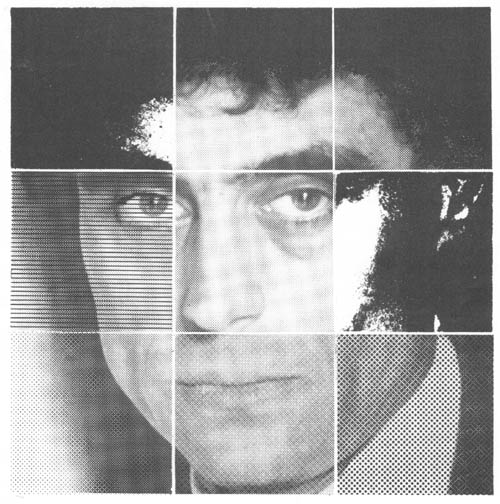
INADMISSIBLE EVIDENCE
by JOHN OSBORNE
directed by KRISTOFFER SIEGEL-TABORI
Producer - Joseph Stern
starring (in order of appearance)
PETER MITCHEL as "Clerk/Jones/Maples"
IAN MCSHANE as "Bill Maitland"
DUNCAN ROSS as "Judge/Hudson"
ROBIN PEARSON ROSE as "Shirley"
JENNY WRIGHT as "Joy/Daughter"
KATE FITZMAURICE as "Mrs. Garnsey/Tonks/Anderson"
JEANNE RUSKIN as "Liz Eaves"
BRUCE GRAY as "Alternate Judge/Hudson"
Setting: London. A solicitor's office. Winter, early 1960s.
From "Anatomy of Britain Today" 1965
"The conservatism of English lawyers is
reinforced by their strict division into solicitors and barristers.. .Only solicitors are allowed to deal directly with the public. ..
.they perform all the routine business: but when they have to take a
case to the central courts, they must employ a barrister to
plead—much as a GP employs a specialist to operate. The two
sides—the wigged and the unwigged—are kept severely apart. ..
.Solicitors remain the 'junior branch of the profession': most of
the mystique and prestige of the law settles on barristers, and only
a barrister can reach the top of the profession—a judgeship."
Bill Maitland is a solicitor; Walter Hudson is
his managing clerk, a position that requires him to decide the
distribution of cases and manage the office. Mr. Jones is a
solicitor's clerk studying for his law exams.
 - WINNER, 1985 L.A. Drama
Critics Circle Award: - WINNER, 1985 L.A. Drama
Critics Circle Award:
Direction (Kristoffer Siegel-Tabori)
Lead Performance (Ian McShane)
Set Design (A. Clark Duncan)
PHOTOS by Christian Simonpietri
Click on any photo to see it larger
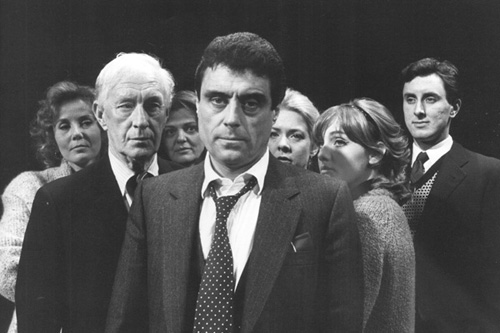
L-R: Jeanne Ruskin, Duncan Ross, Kate Fitzmaurice,
Ian McShane, Robin Pearson Rose, Jenny Wright & Peter Mitchel
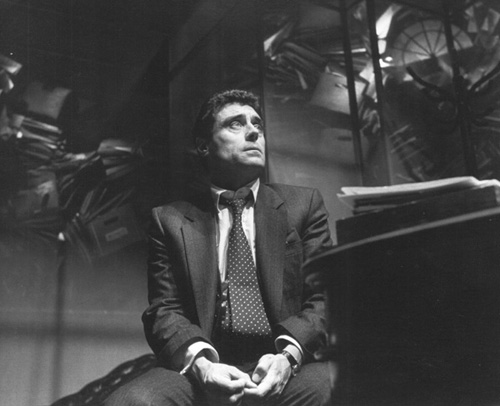
Ian McShane
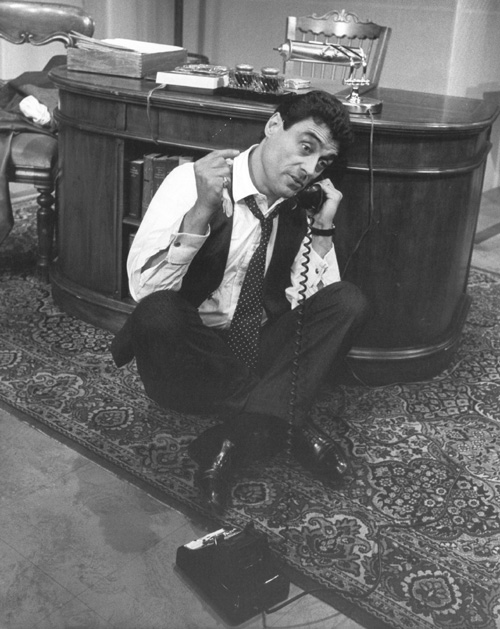
Ian McShane
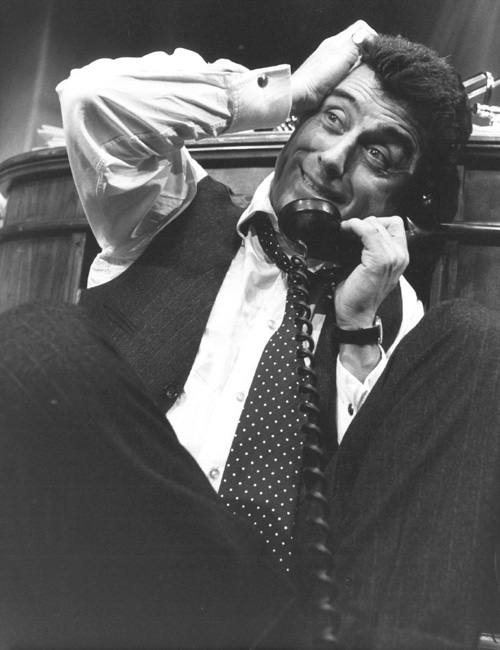
Ian McShane
REVIEWS
L.A. TIMES
By Dan Sullivan, Times Theater Critic
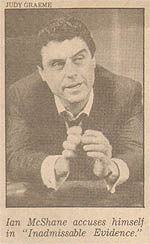 If
you are hungry to see some fine, taut, intelligent acting, get over
to the Matrix Theatre, where Ian McShane and a well-matched Actors
For Themselves company are providing a first-rate revival of John
Osborne's "Inadmissible Evidence" (1965). If
you are hungry to see some fine, taut, intelligent acting, get over
to the Matrix Theatre, where Ian McShane and a well-matched Actors
For Themselves company are providing a first-rate revival of John
Osborne's "Inadmissible Evidence" (1965).
McShane was quoted in Saturday's Times about the
need for the actor to do more than reflect his character. He
should also illumine his character. When playing a character
as disagreeable as Osborne's Bill Maitland, there must be a
temptation to judge him as well. Bill really is a bit of a
cad.
But McShane plays it down the middle. You could
leave this performance detesting Maitland, or identifying with him,
or pitying him. It would depend on where you are in your own life.
McShane simply puts his man on the stand and lets him speak.
Passionately. That's why Bill doesn't bore us, for all his conceit.
Osborne and McShane make Maitland a fascinating case, not so much
for his murky midlife crisis (nothing new there) but for the
commitment with which he is acting it out.
Not only is he fearsomely articulate as he
accuses himself before his own imagined jury (the play is laid
partly in Bill's mind, partly in his law office), his every action
seems to be a plea for punishment and forgiveness. This is a man who
finds the human race, including himself, absolutely despicable. Yet
he still craves love: unconditioned, accepting, redeeming.
By the end of the play Bill has succeeded in
driving off everybody who might love him, including his teen-age
daughter, and scaring off everybody who works for him. Sitting in
his law office at the start of another god-awful day, he probably
hasn't quite reached the end of his mendacity. But it's coming.
Whether he commits suicide or goes off to join the Trappists, the
boil has got to burst.
His only untrue self-accusation is that of
mediocrity. This is a man of extremes (including an extreme
coldness) and McShane understands both his need to dump his
self-loathing on the people around him and his unacknowledged need
to be brought up short, a kindness that nobody in his life quite has
the guts to perform. He's like a Kate without a Petrucchio.
The actors surrounding McShane have less to do.
But under the direction of Kristoffer Siegel-Tabori, each provides
as full an account of his character's identity as the star. Duncan
Ross, for example, makes it clear that Maitland's poker-faced
right-hand man puts up with his abuse for some very good reason of
his own, totally apart from personal affection; we don't need to
know the exact reason to see that it's there.
Peter Mitchel makes the youngest man in the
office a cautious type who may be the plodder that Maitland thinks,
but may also be a Maitland in embryo, once he's finally forgotten
Mum and the lessons learned back home. Robin Pearson Rose is the
secretary who has learned too many lessons from Maitland, and Jenny
Wright is the new girl, who may have some to teach him.
Jeanne Ruskin plays Maitland's mistress with a
coolness clearly based in self-protection and Kate Fitzmaurice plays
a client who both wants to leave her husband and to make him feel
like more of a man, one of the paradoxes that Maitland is sick of
dealing with in his profession.
Fitzmaurice, Wright and Mitchel also play other
roles, and well, but I wish that director Tabori had violated
Osborne's wishes here and found separate actors for these parts.
This would have added to the richness of the show, without
necessarily subtracting from its quasi-hallucinatory air. One can
see many faces in a dream.
A. Clark Duncan's set appears to be a tailored
lawyer's office, but with one brilliant light stroke (Barbara Ling
did the lighting) we see a huge dump of law briefs behind it, as
messy as Maitland's increasingly disturbed mind. The effect seems
less brilliant each time it's used, but carping at this
"Inadmissible Evidence" would be ungrateful. It is dead-accurate
theater.
THE HOLLYWOOD REPORTER, Monday, Feb. 25, 1985
by Ed Kaufman
When English playwright John Osborne gave the world
Jimmy Porter (the antihero of "Look Back in Anger") in the 1950s, it was
the beginning of a new sort of onstage character: the man of anger, of
rage and wrath. Above all, he was the "new man" of England, the
up-and-comer in a world without values or vision.
And what happened to Porter? Simple, by 1965 he became
Bill Maitland, a solicitor, still aggressive and somewhat shady. Never a
proper barrister, mind you, ol' Bill never got to go to the right school
or wear the right tie.
All this sets the stage for Osborne's "Inadmissible
Evidence," currently — and brilliantly — performed by the Actors for
Themselves at the Matrix Theatre on Melrose. We really can't admire the
restless and relentless Maitland. All we can do is watch as he's cut down
by his own anger. Somehow he's clever and a bit of a charmer, but he's
coming unglued and is helpless to turn the tide.
Clinically, he's a sociopath, a scheming and conniving
charmer with a band of followers: a wife, a loving mistress, a secretary,
clients, associates, etc. Only one day solicitor Maitland is "on trial"
and there's really no defense, just the anger, wrath and cruelty. At the
end, he's undone, a man without identity or feelings — and a man alone.
As the aggressive and agitated Maitland, Ian McShane is
absolutely wonderful — a man "on trial" for a way of life. Add first-rate
and solid performances by Peter Mitchel, Duncan Ross, Robin Pearson Rose,
Jenny Wright, Kate Fitzmaurice and Jeanne Ruskin.
Credit Kristoffer Siegel-Tabori for the sensitive
direction; A. Clark Duncan for the sets (one in "reality," the other in
Maitland's unconscious), Barbara Ling for the lighting, Csilla Marki for
the costumes and David Porter for the sound design.
As fine an evening of theatre as you could want.
DRAMA-LOGUE, Feb. 21-27, 1985
by Terry Fisher
You can tell by the way Mrs. Gamsey describes her
adulterous husband to her solicitor Bill Maitland that Maitland realizes
she could well be talking about him. "Nothing works for him," Mrs. Garnsey
says and the statement is one more nail in the coffin Maitland is carving
for himself. Similarly, when Maitland, folded on the floor in near-fetal
position, has a second act telephone conversation with his mistress Liz,
you feel his desperation as if he's trying to strengthen his sinking hold
on reality through an impersonal electronic connection.
John Osbome's Inadmissible Evidence is about a
man clutching at moments, people, anything to keep him from disappearing.
Filled with self-hatred and hate for others, he resorts to shoddy law
practices, uses and abuses women, thrusts pain and contempt on those he
wants most to love and accept him. Beetle-browed Ian McShane brilliantly
imbues the role of Maitland with a neurotic intensity that spews ugliness
and disgust. McShane forces his rugged good looks into a grotesquerie of
all the agonies that haunt Maitland's empty life and threaten to destroy
it. It's no accident Barbara Ling's light probing directly down on
Maitland in the opening dream scene (slightly abridged) at times makes his
eye sockets look empty. McShane plays Maitland to the hilt with the force
of a poisoned dagger stuck in him up to its own hilt, slowly filling him
with venom and draining his life of purpose, reason and fulfillment.
Kristoffer Siegel-Tabori's on-the-edge direction is one
more example of the quality of work consistently produced by Joseph Stern
and Actors For Themselves at the Matrix Theatre. Siegel-Tabori vividly
choreographs the beats of the play and molds them seamlessly in a
trajectory of mortal dissolution. His cast, garbed in Csilla Marki's
just-right clothes, is perfect down to the slightest expression and
inflection. Duncan Ross plays office manager Hudson with phlegmatic mien
and polite contempt for his boss while Peter Mitchel's office clerk Jones
is all callow dispassion. Mitchel returns as Maples, a homosexual client,
in a scene of sensitive self-acceptance. (Ross and Mitchel also appear in
the opening dream scene.)
The simmering anger and futile frustration of
Maitland's secretary Shirley are finely captured by Robin Pearson Rose.
Jenny Wright lives up to the name of Joy, Maitland's sweet-tempered
telephonist, and wordlessly plays his daughter Jane with unerring lack of
filial communication. Kate Fitzmaurice is fine as all the female clients
seeking a divorce (Mrs. Garnsey/Tonks/Anderson) and Jeanne Ruskin is
generously caring as Maitland's lover Liz.
A. Clark Duncan's proper law office takes on new, eerie
dimensions when Ling's excellent lighting reveals, behind the scrimmed
walls, thousands of warped legal files that mirror Maitland's contorted
life. Chuck Estes' bluesy music and David Porter's sound design complete
the environment. This production has the stamp of excellence all over it.
VARIETY, Tues, Mar. 19, 1985
Ian McShane delivers staggering performance as
loathsome, loutish, disintegrating solicitor in year's opening production
by Actors for Themselves at the Matrix Theater.
First staged in London in 1964 and premiered in L.A. in
1967 at the Stage Society (Matrix press material incorrectly lists show as
a west coast premiere), John Osborne's play is a searing exploration of a
womanizing, hard-drinking, self-hating incompetent on the edge of personal
and professional destruction.
Director Kristoffer Siegel-Tabori has whittled the
production to a point where stagecraft is indivisible from the murky and
brittle arena in which McShane, his associates and the women in his life
collide like figures in a dream.
In fact, the drama opens with a fantasy trial, in which
McShane plunges headlong into his nightmare before events segue to the
reality of his law office and the gathering defections of those close to
him.
In contrast to earlier stagings featuring musty and
dingy law offices, set designer A. Clark Duncan and lighting designer
Barbara Ling have smartly created an atmosphere where metallic austerity
subtly chills the proceedings. Another telling touch is the symbolic
mountain of law books and cases seen stacked in chaotic files in a
hallway, a metaphor for the solicitor's jumbled state of mind.
The profligate character (which establishes Nicol
Williamson's career 20 years ago) is yet another of Osborne's patented
angry roles, a continuation of the playwright's Archie Rice in "The
Entertainer" and Jimmy Porter in the seminal "Look Back In Anger."
McShane's particular achievement is bringing an uncanny
vein of sympathy to a man raging with hate, boredom and self-contempt,
although there's no sympathy in the writing.
The work is also brightened by an undertone of
comic-pathetic byplay between the protagonist and those around him.
Characters include a cautious, reserved managing clerk (Duncan Ross, who
is a USC drama prof, in a nicely low-keyed L.A. acting debut), a wheedling
homosexual client and an unctuous clerk (both played by Peter Mitchel), an
amoral office tart and McShane's coldly bitter daughter (both played
sharply by Jenny Wright) and a mistress who also takes a walk (a properly
cool and brittle turn by Jeanne Ruskin).
Other roles are a neurotic, devoted woman who also
defects (Robin Pearson Rose) and a client whose bleak description of her
husband mirrors McShane's own persona and fills him with quiet horror
(Kate Fitzmaurice, who also parleys two other roles).
McShane character could be a self-pitying bore, but the
actor's vigor and persuasion lift this cad up to a level of consuming
interest.
INTERVIEWS with Ian McShane
L.A. TIMES, Feb. 16, 1985
IAN McSHANE GIVES 'EVIDENCE'
by Janice Arkatov
"When people see a performance and say, 'Oh, I know
that character—it's me,' I think that the author, or the actor, has
failed," Ian McShane remarked. "Art should illuminate, not just
reflect. And it should make you think."
These days, the material that has McShane thinking is
John Os-borne's "Inadmissible Evidence," opening tonight at the Matrix
Theatre, 7657 Melrose Ave.
"It's about a man, a lawyer in London, who's going over
the edge. The play starts out in a dream sequence, a mock trial, with Maitland
(his character) on trial for his life—explaining why he's mediocre, why he
really doesn't feel he's worth anything, why he drives everybody away from
him," McShane said.
"It's a very written-from-the-gut play," the British
actor continued, alternating between wake-up coffee and Camels in the
Sunset Strip penthouse he shares with his wife, Gwen. "The character is
confused—and he's flailing."
In his sex life, too. "He has the idea that love
between a man and a woman demands obligations, summonses, time-keeping. So
that anonymous love—in this case, homosexuality—sort of excites him.
"On the other hand, he does want the comfort of a
family and a wife, so it's the anomaly of those two things that he can't
put together."
For McShane, the material's appeal includes its
theatrical architecture: "This play is an attempt to get beyond the 'slice
of life' style to a more classical form, with its grand soliloquies and
going in and out of reality. It's like 'Hamlet'-if he didn't have those
long speeches, the play would be nothing; you wouldn't understand.
"It's the same way with this character. If he just
comes off as a whining bore, then it's pointless."
McShane's last play was a British production of Odets'
"The Big Knife" (in which he played "another middle-aged man who's
flailing"). Recent screen roles have been more varied: a homosexual
doorman in the film "Too Scared to Scream," a "heavy cocaine dealer" in
"Torchlight," and an "erudite, quintessential New York banking Waspy Jew"
in "Evergreen" (airing this month on NBC).
At the moment, however, he's concentrating on the
stage.
"Joe Stern (the play's producer, with whom McShane also
worked two years ago in "Betrayal") was very persuasive about my doing
this show," he said. "It is a great exercise, a big stretch. But this is
not a showcase just for me—that's not why we're doing it. It is, simply, a
play to be done. An extraordinary piece of theater."
LOS ANGELES HERALD EXAMINER, Mon., Feb. 4, 1985
McSHANE MAKES THE BEST OF AMERICA
by Susan King
British expatriate finds a home on our stages and
screens
It's a rainy Monday morning, and Ian McShane isn't
quite awake. He rummages through the kitchen and trots into the bedroom to
ask his wife, actress Gwen Humble, where his cigarettes are. The Camels in
question, it turns out, are resting right next to a copy of John Osborne's
play "Inadmissible Evidence" on the table in the dining room where his
search began.
"This always happens," McShane explains, lighting up
with some satisfaction. His wife hides them because she wants him
to give up the habit. Then, too, he's been rehearsing his role as Bill
Maitland in "Evidence" for Joseph Stern's Matrix Theater in West Hollywood
until 1 a.m. Perhaps that explains why the very gregarious British-born
actor is still a bit groggy.
"Evidence" (currently in previews and scheduled to open
Feb. 16) marks the second time that McShane has performed at the Matrix.
He previously appeared in the critically acclaimed 1982 production of the
Harold Pinter play "Betrayal." "We've been talking about doing another
play," he says. "and this came up, and everything came together. It's very
exciting."
"Evidence," Osborne's biting look at a middle-age
barrister whose life has reached a saturation point, originally premiered
in London 20 years ago and made a star out of Nicol Williamson. It later
ran on Broadway for 166 performances in the 1966 season, and Williamson
also repeated his performance for the 1968 film version. Kristoffer Tabori
is directing the West Coast premiere of the play.
McShane recalls he saw Williamson do the play in
London: "I remember him being wonderful," he says, "but I don't remember
much about it."
Stern, McShane says, has always wanted to do this play.
"It's extraordinary. It's a very heavy piece. My character never stops
talking. It's a great part."
He calls the play "surreal, because it goes in and out
of imagination and life. This is very much an attempt (on-0sborne's part)
te-write a modern piece of high drama. It's not real drama."
Trained at the Royal Academy of Dramatic Arts, McShane
appeared in numerous productions on the London stage (including Joe
Orton's "Loot" and "The Glass Menagerie") and starred on Broadway in "The
Promise." He say he prefers doing Equity-waiver theater — for no pay - in
Los Angeles to working for a salary in such larger houses as the Ahmanson
or the Mark Taper Forum.
"The thing is," he explains while making himself
coffee, "it's very difficult to do straight theater without compromising
when you go into it. The Ahmanson and the Taper have subscriptions and
they know their own boundaries. They put on a Neil Simon play because
they'll know they'll make money; they're not adventurous, there's no
spirit to that."
Working at the Matrix, he says, is different. "Joe
likes to make money, too; he owns the theater, but he's more in
charge of his own destiny and the overall thing in terms of putting the
people together."
And as for the money situation. McShane says, "Of
course you don't get paid, you can't. The one thing that you want it to be
is right. Therefore, the people who have got to be paid are the technical
people. Most of the best work you do is in the lower end of the pay
scale."
McShane also says that he doesn't do theater as a
showcase, which he finds many actors are now doing in Equity-waiver. "The
thing is to do the whole piece," he points out. "We're not doing a play
for me to play Maitland, it's the play itself. If the play's no good,
there's no point in doing it."
Besides appearing in "Inadmissible Evidence," McShane
can also be seen as Sidney, a slimy drug dealer in the film "Torchlight,"
which opened last Friday. "That was a very enjoyable job to do," he says.
"It's a good character."
McShane also will be seen on the small screen later
this month in the NBC miniseries "Evergreen," based on Belva Plain's
best-selling novel -- co-starring Lesley Ann Warren and Armand Assante.
McShane plays the role of Paul, whom he describes as a "sort of third
fourth-generation rich New York Jewish WASP." Warren plays an immigrant,
married to Assante, who works as a maid for Paul's family. "She's in love
with my character, off and on for all of her life. I mean you should
actually start crying when the credits go up and not stop until they go
down," he chuckles.
McShane also has a part in the upcoming NBC miniseries
"A.D." and just finished a two-hour TV pilot called "Breaker" with Carl
Weathers. As soon as he concludes his engagement in "Evidence" in March,
he's heading back to England for six months to do a series for the BBC.
McShane says he's constantly traveling back and forth
from Hollywood to Europe, but he decided in 1975 to live here permanently.
"I just decided to come live here and I work here a lot of the time. I
don't like it here when I'm not working. It's not the best place to be.
It's a strange city."
Though McShane loves doing theater in Los Angeles, he
finds he must make compromises by doing TV. "It's the biggest paper
shredder in the world, American TV. It shreds up a lot of talent. That's
the sad thing about it. On the other hand, it's very productive. It
creates a lot of work so theater can be done."
DAILY TROJAN, Mon., March 4, 1985
McSHANE'S DRAMATIC ROLES CONTRAST HIS LIFE
by Rosemarie Aguilar
This British film and stage actor's constant search
for variety is 'evidenced' in his challenging career
One wouldn't think that Benjamin Disraeli, a brilliant
statesman and prime minister in Victorian England, would have anything in
common with Vincent Hardwicke, a murderous doorman, but they do. Both were
roles played by actor Ian McShane, one of those truly marvelous actors who
should be known for his quality performances, but is better known by the
public for his more exotic characterizations.
For a good part of his early career, McShane was known
in the United States as the basic leading man because of the roles his
swarthy good looks and British suavity secured him in feature films.
Lately, he has become more familiar to audiences because of his acclaimed
perfomances in "Disraeli," a BBC production seen here on PBS, and as Nikos,
a Greek tycoon, on TV's "Bare Essence." But, as anyone with more than a
passing interest in "British imports" can tell you, Ian McShane is a
rather unique entity.
The English-born McShane, who resides in the U.S., is
an incredibly versatile performer. Within the past month he has had two
films released, Torchlight and Too Scared to Scream. Currently, McShane is
indulging in the form of acting which gives him the most satisfaction:
stage performing.
In 1982, McShane won the Los Angeles Critics' Award for
a lead performance for his work in Harold Pinter's Betrayal. That show was
produced by Actors for Themselves at the Matrix Theater on Melrose Avenue,
and McShane is back there again to do John Osborne's Inadmissible
Evidence. Under the direction of Kristoffer Siegel-Tabori, McShane is
playing Bill Maitland, an Osbornian Everyman, who is struggling with
himself about the way he has lived his life.
The play, McShane admitted, is quite difficult due to
the "sheer emotional content" of Osborne's writing. The character of Bill
is very demanding on an actor as there is a lot of difficult, subtle
dialog for McShane to perform. McShane said that he decided to return to
L.A. theater now simply because the time and the play are right for him.
For over two years, he and producer Joseph Stern had been trying to work
together again, as they did on Betrayal.
"We've talked about various plays, had a few readings
and this is the one that seemed the right one to do," McShane said. "It's
a tough bird to do, so it was not a matter of choosing carefully, it was
question of doing a play because it's a worthy, serious drama. It's not a
showcase for anybody, a lot of Equity work is done to showcase, but that's
not what it's about."
Despite what he may say, Inadmissible Evidence is
McShane's show. He is surrounded by a wonderful cast and incredible
production designs, but nonetheless, Osborne wrote Bill Maitland as a
representative of modern man, and he is the center of the play.
In his recent film releases, this was not the case,
however. In the badly received Too Scared to Scream, McShane played
Vincent Hardwicke. Though Hardwicke is the killer in that slasher film, as
in all films of that genre, the blood and gore are the real stars. In
Torchlight, McShane played a sleazy cocaine pusher named Sidney.
Again, this role was not exactly Oscar-winning material, but McShane has
no regrets about playing the parts.
"I enjoyed playing them for what they represent within
each script and you're servicing the piece as a whole usually. Sidney the
drug pusher in Torchlight, he was fun to play... you don't know who he
likes. He might like dogs, you know, Alsatians with whips. Vincent's
mother-fixated, obsessive... he was fun as well, I liked him. They all
retain a certain little piece of your heart.
"Then you've got Maitland. Maitland's wonderful, he's
one of those extraordinary characters that dares. It's an attempt to do a
modern day classic drama in a sense. He's not a Hamlet, but he's working
out his problems in the same way. He's working them out on everybody else,
trying to make them see, trying to see through others what his own problem
is."
Unlike the tortured character he plays in Inadmissible
Evidence, McShane doesn't let much bother him. Torchlight and Too Scared
to Scream were badly received by critics, although McShane's performances
did garner some plaudits. Still, the judgement of the press is of little
importance to him, and he actually agrees with their criticism.
"I don't think they're great films, I wouldn't bother
to see them myself; I've not seen them."
Actually, McShane confessed he did see Torchlight in
Atlanta but only because its premiere was a benefit for a drug recovery
program.
"It was a good cause, but otherwise I wouldn't bother
to see films I'm in. I don't get impressed by seeing myself up on the
screen."
Now modesty is all well and good, and rarely found in
the acting profession, but why then would an actor make bad films? McShane
said that in making the films, you never can be sure of the final product.
The film is so dependent upon a director's vision of it, that despite a
good script and a good performance, things can still go wrong.
Such was the case with Torchlight. He said that the
script to that movie was very good, but that the story was never brought
out. As for his involvement with the project McShane said, "It was a great
part to play; you have a good time and you leave. It's like a hired gun on
jobs like that, you know, you go into town, you clean up and you leave."
McShane may seem to take his profession lightly, but he
actually doesn't. You only have to see him work to know that. Given his
choice, there is nothing else he'd rather be doing, although he dislikes
the things that go along with the profession, like publicity and agents.
"Acting intrigues me more than anything else and I love
doing it. It's my job and it's enormously satisfying and enormously
challenging. The other side of it, I don't like it, the publicity side,
that's the bullshit side. Some actors have based their whole career on
that, they're much better at talking a good game than doing it. I'd much
rather be judged on what you do than what you talk about. I've never
looked for it (publicity) in my life. It's not one of my favorite things.
"I believe in agents for a purpose, they've got their
job to do. In a sense, you pay for their new office or whatever. Leaving
your life to an agent is like changing deck chairs on the Titanic."
The career planning method that McShane prefers is one
of relative unplanning, and it has allowed him the freedom to work in
Europe, as well as in the U.S. His latest film was done across the
Atlantic. It is an Agatha Christie picture which features Faye Dunaway and
Donald Sutherland and will have a royal premiere this month. McShane said
British productions are no better than American productions, despite the
quality shows brought across the ocean and shown on public television. We
are only seeing the best of the BBC, and get to miss the worst shows on
British television.
One of Britain's best exports was "Disraeli," which was
shown on "Masterpiece Theatre" a few seasons ago McShane was brilliant as
the Victorian prime minister, but even the success of that series failed
to make McShane's name a household word. But, characteristically, it
doesn't seem to worry McShane that he is not a "star."
"Being a star carries a lot of ridiculous baggage with
it in whatever terms you put it, so I'll stick to actor. With television
such a monster, people tend to believe acting is what television is, which
is a bit sad if they think that. They think the road to glory is a feature
film and a television series and that's the end of it.
"Actually, an actor is at the lowest end of the totem
pole in terms of what you're doing, but it's you that's out there. You get
the glory and you get the shit, and you've got to take it for that. It's
also a job, you're serving a playwright like Osborne. It's a very serious,
wonderful way to earn a living, and that's what I like about it. (Still),
coming to do this play's a big undertaking, but it's not finding the cure
for cancer. That's what it comes down to."
Set Design - A. CLARK DUNCAN
Lighting Design - BARBARA LING
Costume Design - CSILLA MARKI
Stage Manager - GILPIN NETBURN
Original Music - CHUCK ESTES
Sound Design - DAVID PORTER
Production Coordinator - JANET MITSUI
Musicians:
Drums - JOHN JOHNSON
Bass - MARTIN TARDIF
Alto Sax - EDWARD D'ANGELO
Piano - CHUCK ESTES
Return to the list of Past
Productions |